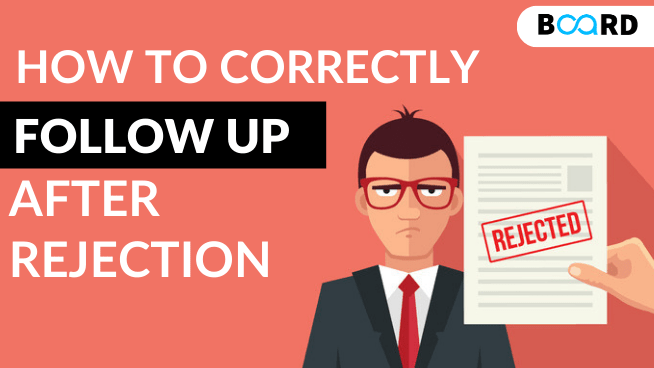Mastering Advanced Interview Techniques
How To Correctly Follow Up after Rejection in a Job Interview

So you’ve gone through multiple rounds of interviews, sent your follow-up thank-you emails and you’re patiently waiting—and you see this email which says you’re not selected.
Yes, that can be very disheartening. But you need to take it in your stride and try to think about how you make the best of your situation. You need to learn how to follow up after a rejection letter.
Why did you get one in the First Place?
It may be because of competition or capability. The recruiters receive dozens of resumes for every job posting, maybe even hundreds. They will only select candidates which fulfill certain basic criteria. Often you might end up losing the game because other candidates had better skills or are more desirable professionally.
You may think why follow up after a rejection letter? How will it help anyway?
The reason being, following up on a rejection letter shows you’re a professional and that you cared about the job, personally. This way of response gives a personal touch and helps you maintain a connection with the hiring manager.
There are situations in which it isn’t necessary to follow up, which is solely at your discretion basis how your interview went. Unless you have a really valid reason to not follow up, then responding is the best tactic to adopt.
How to Write One?
The rules of the game are pretty much the same. Include your contact information and sign off formally. Also include the position you interviewed for, so the recruiter remembers you better. Accurately spell your letter, proofread it and make it impressive.
Below are some tips on how to write a follow-up letter when you’re facing job rejection.
Acknowledge the fact that you’re Discouraged on not bagging the job (in a non-aggressive, non-complaining way) in a way that’s honest and genuine. Keeping your overall tone positive, you can express how you looked forward to the stint.
Thank them Profusely for their time invested and for the experience they helped with. Mention some highlights of the interview or anything before/after that which you appreciate and remember.
Ask to be Considered for future open positions in the company. This rejection doesn’t mean the doors are permanently closed. There are always better possibilities. It’s always better to tell them that you’re willing to work for them, no matter the outcome.
Request Feedback if you haven’t already in your thank-you email after the interview. Negative feedback should always be taken sportingly and constructively. If you’re not of a sporting nature, avoid asking for this, as it may put you off.
Feeling all confused about what to do next in your career?
We have a one-stop solution for you where you'll get personalized coaching from 700+ coaches to land your dream job.
Need help? Tap Here
